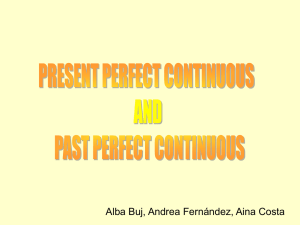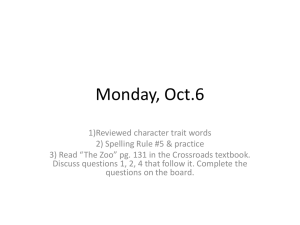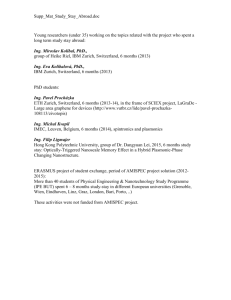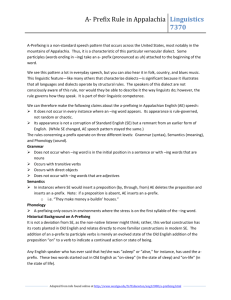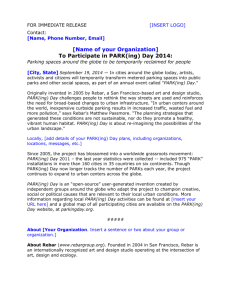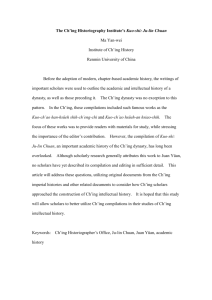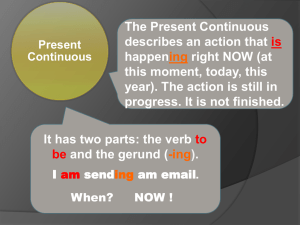Past Tense and Past Continuous Verbs
advertisement
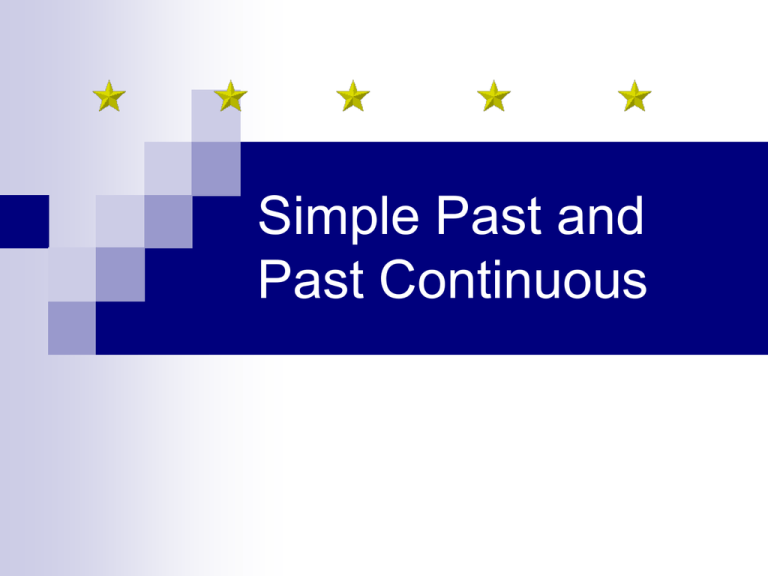
Simple Past and Past Continuous Simple Past Tense Actions, events, states that started and finished in the past (…ago, last …, yesterday… ) Regular verbs: -ed Irregular verbs: 2nd column Tell your partner – use past simple What did you do yesterday? What did you do Friday night? Where were you Saturday morning? How did you do celebrate your last birthday? Practice: Do you have a good memory? Are you a good witness? Directions: Look at the following picture for one minute. Try to remember as many details as you can, but don’t write anything. Only one minute… Ready, go …. One minute… What do you remember? 1. 2. 3. 4. 5. 6. 7. 8. 9. 10. 11. 12. 13. How many people were there? Where were the people? What was hanging from the ceiling? What was the bank robber holding? What was the bank robber wearing? What colour was his hair? What was covering the bank robber’s face? Was the bank robber right-handed or left-handed? What was the bank manager doing? What was the bank teller doing? Who was walking into the bank? What time was it? What was under the bank manager’s desk? One minute… Past continuous Gebruik 1) Om te beschrijven wat bezig was in “het verleden” What were you doing at 9 in the evening? I was watching TV We were playing Monopoly Past continuous I You He was were was She It We You They was was were were were ww + ing Tell a classmate – use past continuous verbs: I was _______ing Where were you last Thursday at 8 p.m.? What were you doing? What were you doing Friday at 5 p.m.? Where were you? Who were you with? What were you doing Sunday morning at 7 a.m.? What were you doing last night at nine o’clock? What were you doing last Saturday afternoon? Past Continuous, continued Gebruik 2) Twee bezigheden tegelijkertijd Sorry, I wasn’t listening to you while you were talking. While I was reading, he was writing. Simple past met past continuous in één zin, gebruik 3 past continuous geeft aan wat bezig was I was crossing the street …when the driver ran through the red light. Past simple geeft aan de actie die de handeling onderbreekt Other examples: I was sleeping when the telephone rang and woke me up. He was driving too fast when he crashed the car. More Examples: We were watching the news when the announcer made a special live report. I was trying to study when you called. Form of Past Continuous Subject + was / were + verb+ing Negation: Subject + was / were + not + verb+ing Yes/ No Question: Was / Were + subject + + verb+ing ? Information Question: (WH) + Was / Were + subject + + verb+ing ? Remember –ing spelling rules? Verb ending in... (Most verbs) 1 vowel + 1 consonant 1 vowel + 1 consonant + E Final –ie How to make the -ING form Add -ING Double the consonant, then add -ING Examples say - saying go - going walk - walking swim - swimming hit - hitting get - getting Remove E, then add –ING come - coming lose - losing live – living Change –ie to y, then add -ING die – dying tie -- tying A little practice The telephone (ring) when I (take a shower). The telephone rang when I was taking a shower. I (eat) dinner when you (come) in. I was eating dinner when you came in. It (rain) while they (walk) home. It was raining while they were walking home. We (see) an accident when we (drive) on the freeway. We saw an accident when we were driving on the freeway. A little practice 2 She (chop) onions when she (cut) her finger. .She was chopping onions when she cut her finger We (watch) TV when the electricity (go) out. We were watching TV when the electricity went out. My dad (do) the dishes while my mum (send) an email. My dad was doing the dishes while my mum was sending an email. Final Tips … Use while for two actions in progress at the same time in the past: Gelijktijdigheid She was talking while he was driving. Use when for an action that was in progress that was interrupted by another event in the past): I was just leaving when you called. (handeling bezig) (“storing”) Punctuation with When and While When and while at the front of a sentence, use a comma: When you called, I was watching TV. While he was washing the clothes, I was doing the dishes. When and while in the middle of a sentence, no comma I was watching TV when you called. I was doing the dishes while he was washing the clothes.




